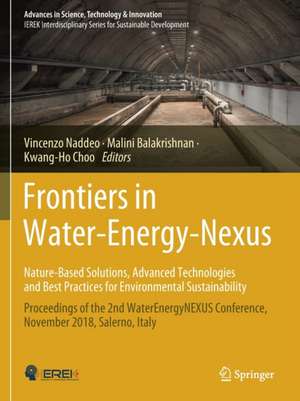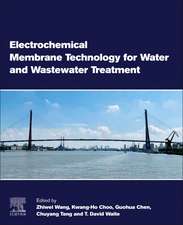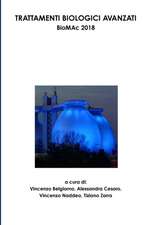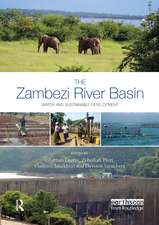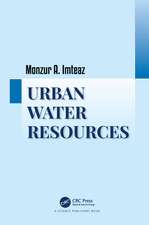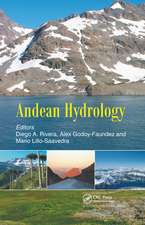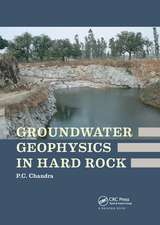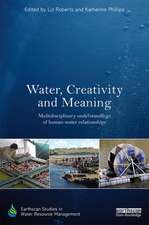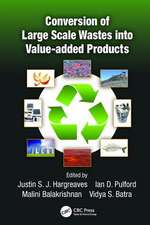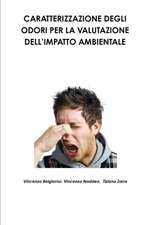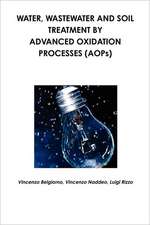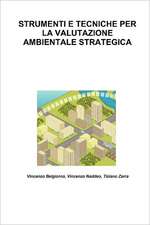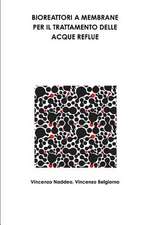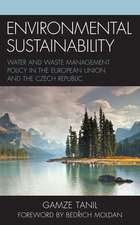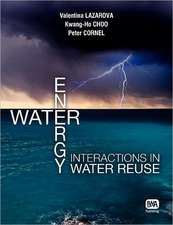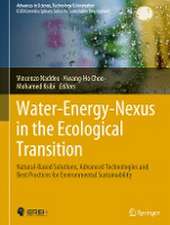Frontiers in Water-Energy-Nexus—Nature-Based Solutions, Advanced Technologies and Best Practices for Environmental Sustainability: Proceedings of the 2nd WaterEnergyNEXUS Conference, November 2018, Salerno, Italy: Advances in Science, Technology & Innovation
Editat de Vincenzo Naddeo, Malini Balakrishnan, Kwang-Ho Chooen Limba Engleză Paperback – 19 sep 2020
| Toate formatele și edițiile | Preț | Express |
|---|---|---|
| Paperback (1) | 1408.71 lei 43-57 zile | |
| Springer International Publishing – 19 sep 2020 | 1408.71 lei 43-57 zile | |
| Hardback (1) | 1402.35 lei 22-36 zile | |
| Springer International Publishing – 19 sep 2019 | 1402.35 lei 22-36 zile |
Din seria Advances in Science, Technology & Innovation
- 18%
 Preț: 2114.60 lei
Preț: 2114.60 lei - 20%
 Preț: 1081.52 lei
Preț: 1081.52 lei - 18%
 Preț: 1254.36 lei
Preț: 1254.36 lei - 18%
 Preț: 1243.29 lei
Preț: 1243.29 lei - 18%
 Preț: 799.79 lei
Preț: 799.79 lei - 18%
 Preț: 1566.90 lei
Preț: 1566.90 lei - 18%
 Preț: 2135.11 lei
Preț: 2135.11 lei - 18%
 Preț: 1699.47 lei
Preț: 1699.47 lei - 18%
 Preț: 1248.02 lei
Preț: 1248.02 lei - 15%
 Preț: 653.14 lei
Preț: 653.14 lei - 15%
 Preț: 666.24 lei
Preț: 666.24 lei - 18%
 Preț: 1677.26 lei
Preț: 1677.26 lei - 18%
 Preț: 1444.55 lei
Preț: 1444.55 lei - 15%
 Preț: 653.14 lei
Preț: 653.14 lei - 18%
 Preț: 1248.20 lei
Preț: 1248.20 lei - 18%
 Preț: 1233.83 lei
Preț: 1233.83 lei - 18%
 Preț: 1565.29 lei
Preț: 1565.29 lei - 18%
 Preț: 1403.52 lei
Preț: 1403.52 lei - 18%
 Preț: 1121.76 lei
Preț: 1121.76 lei - 18%
 Preț: 1400.35 lei
Preț: 1400.35 lei - 18%
 Preț: 1392.46 lei
Preț: 1392.46 lei - 18%
 Preț: 1121.76 lei
Preț: 1121.76 lei - 18%
 Preț: 1405.09 lei
Preț: 1405.09 lei - 15%
 Preț: 653.14 lei
Preț: 653.14 lei - 18%
 Preț: 1834.58 lei
Preț: 1834.58 lei - 18%
 Preț: 948.92 lei
Preț: 948.92 lei - 15%
 Preț: 648.24 lei
Preț: 648.24 lei - 18%
 Preț: 1230.66 lei
Preț: 1230.66 lei - 15%
 Preț: 704.69 lei
Preț: 704.69 lei - 20%
 Preț: 1167.33 lei
Preț: 1167.33 lei - 18%
 Preț: 1866.00 lei
Preț: 1866.00 lei - 18%
 Preț: 1128.08 lei
Preț: 1128.08 lei - 18%
 Preț: 972.62 lei
Preț: 972.62 lei - 18%
 Preț: 967.40 lei
Preț: 967.40 lei - 18%
 Preț: 900.80 lei
Preț: 900.80 lei - 18%
 Preț: 1008.12 lei
Preț: 1008.12 lei - 15%
 Preț: 646.62 lei
Preț: 646.62 lei - 18%
 Preț: 1128.08 lei
Preț: 1128.08 lei - 18%
 Preț: 1402.35 lei
Preț: 1402.35 lei - 18%
 Preț: 1576.37 lei
Preț: 1576.37 lei - 15%
 Preț: 601.60 lei
Preț: 601.60 lei - 18%
 Preț: 1211.72 lei
Preț: 1211.72 lei - 20%
 Preț: 673.17 lei
Preț: 673.17 lei - 15%
 Preț: 651.51 lei
Preț: 651.51 lei - 18%
 Preț: 1242.83 lei
Preț: 1242.83 lei - 18%
 Preț: 1248.68 lei
Preț: 1248.68 lei - 18%
 Preț: 1233.83 lei
Preț: 1233.83 lei - 18%
 Preț: 1587.39 lei
Preț: 1587.39 lei - 18%
 Preț: 1241.73 lei
Preț: 1241.73 lei - 5%
 Preț: 1322.29 lei
Preț: 1322.29 lei
Preț: 1408.71 lei
Preț vechi: 1717.94 lei
-18% Nou
Puncte Express: 2113
Preț estimativ în valută:
269.55€ • 282.19$ • 223.04£
269.55€ • 282.19$ • 223.04£
Carte tipărită la comandă
Livrare economică 07-21 aprilie
Preluare comenzi: 021 569.72.76
Specificații
ISBN-13: 9783030130701
ISBN-10: 3030130703
Pagini: 528
Ilustrații: XXVII, 528 p.
Dimensiuni: 210 x 279 mm
Greutate: 1.24 kg
Ediția:1st ed. 2020
Editura: Springer International Publishing
Colecția Springer
Seria Advances in Science, Technology & Innovation
Locul publicării:Cham, Switzerland
ISBN-10: 3030130703
Pagini: 528
Ilustrații: XXVII, 528 p.
Dimensiuni: 210 x 279 mm
Greutate: 1.24 kg
Ediția:1st ed. 2020
Editura: Springer International Publishing
Colecția Springer
Seria Advances in Science, Technology & Innovation
Locul publicării:Cham, Switzerland
Cuprins
Approaching bioelectrochemical systems to real facilities within the framework of CO2 valorization and biogas upgrading.- Water Energy Nexus in the Gulf: A Complex Network of Multi-Level Interdependencies.- A risk assessment approach for water-energy systems.- Estimating the declining discount rate for the economic evaluation of projects in the energy and water sectors.- Towards resilience-informed decision making in critical infrastructure networks.- Short-term forecasting of tank water levels serving urban water distribution networks with ARIMA models.- Energy balance in the water cycle in Italy: state of the art and perspectives.- Water Energy Nexus: evalutation of the enviromental impact in the national and international scenarios.- Water scarcity and shale gas prospects in Tunisia – potential impacts of hydraulic fracturing on regional water stress.- "Energy performance of Italian urban water systems".- Analysis of the Economic Net Benefit of Green Infrastructure by Comparing the Water-retentive Block and the Normal Block.- Levering industry and professional qualifications over water efficiency and water-energy nexus in buildings.- WEFSiM: A Model for Water-Energy-Food Nexus Simulation and Optimization.- Assessment of rain harvesting and RES desalination for meeting water needs in an Island in Greece.- Grounding Nexus Governance: de-nexused developments in Nepal.- Maximizing water-food-energy nexus synergies at Basin Scale.- Visualizing CO2 to Account for Emission Obligation in Power Systems.- Selection of key characteristics for crops to deal with climate change through quality function deployment.- Combined electrodialysis and photo-electro-chlorination for energy efficient control of brine water.- Hydrogen production in electro membrane bioreactors.- Use of high-valent metal species produced by the Fenton (-like) reactions in water treatment.- Photocatalytic oxidation of organic compounds by visible light-illuminated g-C3N4-AQ in combination with Fe(III).- Microalgae-based processes as an energy efficient platform for water reclamation and resource recovery.- "Ozonation in the Framework of Sustainable Future Water Management".- Pilot study for Spiral wound -pvdf supported UF membranes for brackish water desalination system.- Energy monitoring of a Wastewater Treatment Plant in Salerno, Campania region (Southern Italy).- Sulfate radicals-based technology as a promising strategy for wastewater management.- Fluoxetine and pirimicarb abatement by ecofriendly electro-Fenton process.- Diversity and performance of sulphate reducing bacteria in acid mine drainage remediation systems.- Sustainable materials for affordable point-of-use water purification.- Self-forming dynamic membrane: a review.- Influence of membrane flux, ultrasonic frequency and recycle ratio in the hybrid process USAMe.- Using Water-Energy nexus as greenhouse gas emissions mitigation tool in wastewater treatment plants.- Corrosion behavior of carbon steel in the presence of Escherichia coli and Pseudomonas fluorescens biofilm in reclaimed water.- Development of Pilot-Scale Photocatalytic Reactor Employing Novel TiO2 Epoxy Grains for Wastewater Treatment.- Evaluation of fungal white-rot strains for assisting in algal harvest in wastewater.- Event scale modelling of experimental green roofs runoff in a Mediterranean environment.- Advanced technologies for satellite monitoring of water resources.- Tannery wastewater treatment after biological pretreatment by using electrochemical oxidation.- Numerical modelling of integrated OMBR-NF hybrid system for simultaneous wastewater reclamation and brine management.- Climate, soil moisture and drainage layer properties impact on green roofs in a Mediterranean environment.- Orthophosphate vs bicarbonate for buffering the acidification in a bromide enhanced ozonation of ammonia nitrogen.- New approach with fluidized bed reactor using low-cost pyrophillite/alumina composite membrane for industrial wastewater treatment.- Impact of seasonality on quorum quenching efficacy and stability for biofouling control in membrane bioreactors.- Surface modification of RO desalination membrane using ZnO nanoparticles of different morphologies to mitigate fouling.- Nutrient removal and biomass production by immobilized Chlorella vulgaris.- Treatment of printed circuit board wastewater containing copper and nickel ions by fluidized-bed homogeneous granulation process.- Investigation of the synthesis and adsorption kinetics of biochar-supported Fe3-xMnxO4 for imidacloprid pesticide removal.- A kinetic study of calcium carbonate granulation through fluidized-bed homogeneous process for removal of calcium-hardness from raw and tap waters.- Destruction of selected pharmaceuticals with peroxydisulfate (Pds): An influence of Pds activation methods.- Non-destructive in-situ fouling monitoring in membrane processes.- Preparation of TiO2/SiO2 ceramic membranes via sol-gel dip coating for the treatment of produced wastewater.- Multicriteria evaluation of novel technologies for organic micropollutants removal in advanced water reclamation schemes for indirect potable reuse.- Environmental or economic considerations in photo-Fenton processes: what choice has the most notable benefits for large scale applications?.- Optimization of energy consumption in activated sludge process using deep learning selective modeling.- Electrochemical sensors for emerging contaminants: diclofenac preconcentration and detection on paper-based electrodes.- Optimization of the wastewater treatment plant: from energy saving to environmental impact mitigation.- Influence of microalgae-bacteria consortium on the pathogens removal (Pseudomonas aeruginosa and Escherichia coli) in domestic wastewater.- Fuzzy-assisted ultrafiltration of wastewater from milk industries.- Performance of Electro-Fenton water treatment technology in decreasing zebrafish embryotoxicity elicited by a mixture of organic contaminants.- "An overview of photocatalytic drinking water treatment".- Solar Light Initiated Photoinactivation of E.coli: Influence of Natural Organic Matter.- Molecular size distribution profiles of organic matrix in reverse osmosis concentrate under oxidative and non-oxidative conditions.- Solar Photocatalytic Degradation of Humic Acids using Copper Doped TiO2.- Hyperspectral Monitoring of a Constructed Wetland as a Tertiary Treatment in a Wastewater Treatment Plant for Domestic Sewage.- Applicability of WQI and scientific communication for conservation of River GangaSystem in India.- Techno-economic feasibility of membrane bioreactor (MBR).- Electrochemical wastewater treatment with SnO2-based electrodes: a review.- Statistical analysis of the quality indicators of the Danube River water (in Romania).- Statistical analysis of the water quality of the major rivers in India.- Methane and hydrogen production from cotton wastes in dark fermentation process under anaerobic and microaerobic conditions.- Microalgae production coupled with simulated black water treatment.- Waterborne diseases in Sebou watershed.- Chances and barriers of wastewater heat recovery from a multidisciplinary perspective.- Mine water in the closure of a coal basin: From waste to potential resources.- Water Pollution by Polyclorinated Biphenyls from the Energy Sector of Armenia.- Semi-continuous anaerobic digestion of orange peel waste: preliminary results.- Nonwoven wet wipes can be hazardous substances in wastewater systems – evidences from a field measurement campaign in Berlin, Germany.- Wastewater to energy: Relating granule size and biogas production of UASB reactors treating municipal wastewater.- CO2 bio-fixation by Chlamydomonas reinhardtii using different periodic CO2 dosing strategies.- A suggestion on nutrient removal/recovery from source separated human urine using clinoptilolite combined with anaerobic processing.- Niches for Bioelectrochemical systems in wastewater treatment plants.- Degradation of Gaseous VOCs by Ultrasonication: Effect of Water Recirculation and Ozone Addition.- Optimal Chlorination Station Scheduling in an Operating Water Distribution Network Using GANetXL.- Utilization of microalgae cultivated in municipal wastewater for CO2 fixation from power plant flue gas and lipid production.- Techno-economic Assessment of Combined Heat and Power Units Fueled by Waste Vegetable Oil for Wastewater Treatment Plants: a Real Case Study.- Eco-LCA of Biological Wastewater Treatments Focused on Energy Recovery.- Optimization of nutrient recovery from synthetic swine wastewater using Response Surface Methodology.- Enzymatic pre-treatment of chicken manure for improved biogas yield.- Integration of liquid-liquid membrane contactors and electrodialysis for ammonia recovery from urban wastewaters.- Remediation of water contaminated by Pb(II) using virgin coniferous wood biochar as adsorbent.- A simplified model to simulate a bioaugmented anaerobic digestion of lignocellulosic biomass.- Dissolved oxygen perturbations: a new strategy to enhance the removal of organic micropollutants in activated sludge process.- PFOA and PFOS removal processes in activated sludge reactor at laboratory scale.- Selectrodialysis and ion-exchange resins as integration processes for copper and zinc recovery from metallurgical streams containing arsenic.- Microalgae cultivation for pretreatemnt of pharmaceutical wastewater associated with microbial fuel cell and Biomass feed stock production.- Embryotoxicity and molecular alterations of fluoxetine and norfluoxetine in early zebrafish larvae.- Biological Treatment of Municipal Wastewater Using Green Microalgae and Activated Sludge as Combined Culture.- Fouling morphologies on the ion-exchange membranes in reverse electridialysis with effluent from sewage treatment plant.- Co-composting Biosolids and Organic Fraction of Municipal Solid Waste or Carbonized Rice Hull and Trichoderma harzianum Augmented Inoculum.- Production of bioenergy and biochemicals from organic solid waste: influence of the pretreatment operating parameters.- Sulfate ion removal from reverse osmosis concentrate using electrodialysis and nano-filtration in combination with ettringite pricipitation.- Increasing sustainability on the metallurgical industry by integration of membrane NF processes: acid recovery.- Overview of the water requirements for energy production in Africa.- Evaluation of Water-Energy Nexus in Sakarya River Basin, Turkey.- Water-energy nexus in shallow geothermal systems.- Singular Applications of Capacitive Deionization: Reduction of the Brine Volume from Brackish Water Reverse Osmosis Plants.- An unprecedented thousand-fold enhancement of antimicrobial activity of metal ions by selective anion treatment.- Harnessing Water Chemistry to Address Complex Water Challenges for a Thirsty World.- Photo(cata)lytic membrane bioreactors for bacterial disinfection and anti-fouling enhancement in advanced wastewater treatment.- Water Networks as Flexible Loads to Power Systems.- Preparation of PES/GO/APTES-SiO2 mixed matrix membrane for the treatment of oily wastewater.- Ayun Mousa Springs: Integrated Hydrological, Environmental and Geophysical Studies.- Modelling Demand and Response in WWTPs: Extension of BSM1 with aeration tank settling.- Miscanthus as energy crop and mean of mitigating flood.- Technical-economic comparison of chemical precipitation and ion exchange processes for the removal of phosphorous from wastewater.- Advancements of electrically enhanced membrane bioreactor (eMBR) for wastewater treatment via coupling with novel inorganic, and polymeric mixed matrix membranes.- Cost effective removal of COD in the pre-treatment of wastewater from paper industry.- Sensors for water purification using the example of wastewater treatment plant Gabrovo, Bulgaria.- Design an Integration Platform Between Water Energy Nexus and Business Model applied for Sustainable Development.- New tools and approaches for soil and water bioengineering in the Mediterranean to enhance water quality.- Multi-criteria decision making for the selection of best practice seawater desalination technologies.- Modeling Co-treatment of Leachate in MunicipalWastewater Treatment Plants in the Context of Dynamic Loads and Energy Prices.- Microfiltered digestate to fertigation: a best practice to improve water and energy efficiency in the context of Biogasdoneright™.- Optimal Design of Water Distribution Networks Incorporating Reliability Criteria.- Creating Abundance: Nexus Stress as A Driver for Innovation In Solving Energy and Water Stress.- Using Fast Messy Genetic Algorithm to Optimally Schedule Pump Operation.- Membrane Aerated Biofilm Reactor (MABR) – Distributed Treatment of Wastewater at Low Energy Consumption.- Method to assess wastewater pumps in the nexus of functionality and energy efficiency.- Role of pretreatment in adsorption of Cobalt, Mercury and Nickel by native algae.- A model-based approach for energy optimization of real wastewater pumping station.
Notă biografică
Prof. Choo received his Ph.D. degree from Seoul National University, Korea in 1996 and since then has been working on membrane science and technology for water and wastewater, pursuing innovative solutions for sustainable water production and reuse. His recent research interests include membrane electro-oxidizers and quorum quenching membrane bioreactors. He is currently keen to find synergistic options for water-energy nexus issues, using membranes in conjunction with physicochemical/biological strategies, such as iron oxide adsorption, photocatalysis, electrocatalysis, and microbial quorum quenching. He has been actively involved in academic societies, such as International Water Association, Korean Society of Environmental Engineers, and Membrane Society of Korea, and Korean Institute of Chemical Engineers, as an active board/editorial member.
Prof. Vincenzo Naddeo is associate professor at Department of Civil Engineering of theUniversity of Salerno (Italy) where he drives research activities at the Sanitary Environmental Engineering Division (SEED). He was visiting professor at University of Washington (2009) and Yamaguchi Uniersity (2016). He is Associate Editor of the Euro Mediterranean Journal for Environmental Integration (Springer) and co-founding Chair of the conference series WaterEnergyNEXUS. He presently serves on the editorial board of several ISI journals including Scientific Reports (Nature Research), Heliyon (Elsevier), PeerJ (Life, Bio, Environment & Health Sciences) and he is actively involved in a variety of scientific organizations, funding agencies, and European networks. Dr. Naddeo has (co-) authored over 170 refereed publications in ISI journals, congress proceedings and book volumes. He holds 4 patents on water and wastewater treatments by sonolisys and 1 patent on novel electronic nose (e.Nose).
Prof. Balakrishnan's major interests are development and dissemination of environmentally sound technologies, with emphasis on membrane development and applications. She has directed various externally funded projects involving international consortia, as well as projects with industrial applications and is also active in developing and effecting technology transfer of membrane processes and products to industry. Dr Balakrishnan's research has evolved around (a) Microfiltration /ultrafiltration / pervaporation process development (b) new membrane materials (c) value-added utilization of wastes. Primarily, the work is targeted at providing solutions to specific problems with strong local relevance (e.g. advanced wastewater treatment) and is associated with addressing the concerns of major Indian industries (e.g. sugar factories for improved clarification in sugar production process, new applications of waste bagasse fly ash). The research activities are primarily directed at users’ needs with doctoral and masters students concurrently contributing to advancing the state-of-the-art in these fields. She has over 100 publications in ISI journals and conferences to her credit and four patents under processing.
Textul de pe ultima copertă
This volume includes selected contributions presented during the 2nd edition of the international conference on WaterEnergyNEXUS which was held in Salerno, Italy in November 2018. This conference was organized by the Sanitary Environmental Engineering Division (SEED) of the University of Salerno (Italy) in cooperation with Advanced Institute of Water Industry at Kyungpook National University (Korea) and with The Energy and Resources Institute, TERI (India). The initiative received the patronage of UNESCO – World Water Association Programme (WWAP) and of the International Water Association (IWA) and was organized with the support of Springer (MENA Publishing Program), Arab Water Council (AWC), Korean Society of Environmental Engineering (KSEE) and Italian Society of Sanitary Environmental Engineering Professors (GITISA). With the support of international experts invited as plenary and keynote speakers, the conference aimed to give a platform for Euro-Mediterranean countries to share and discuss key topics on such water-energy issues through the presentation of nature-based solutions, advanced technologies and best practices for a more sustainable environment. This volume gives a general and brief overview on current research focusing on emerging Water-Energy-Nexus issues and challenges and its potential applications to a variety of environmental problems that are impacting the Euro-Mediterranean zone and surrounding regions. A selection of novel and alternative solutions applied worldwide are included. The volume contains over about one hundred carefully refereed contributions from 44 countries worldwide selected for the conference. Topics covered include (1) Nexus framework and governance, (2) Environmental solutions for the sustainable development of the water sector, (3) future clean energy technologies and systems under water constraints, (4) environmental engineering and management, (5) Implementation and best practices Intended for researchers in environmental engineering, environmental science, chemistry, and civil engineering. This volume is also an invaluable guide for industry professionals working in both water and energy sectors.
Caracteristici
Provides a comprehensive updated framework on the emerging topic of Water-Energy Nexus and its perspectives on the future of the nexus agenda Discusses latest advances in environmental science and technology from diverse backgrounds aiming for the sustainable development of Water and Energy sectors Demonstrates how science, novel technologies and policies can contribute to promoting a more sustainable environment using a nexus approach Maximizes reader insights into emerging environmental issues and challenges in Water and Energy issues with examples of the nexus approach in practice from different regions of the world
